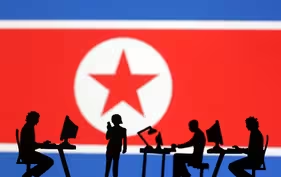
What’s behind a thrifting boom among American shoppers
Clip: 7/5/2025 | 7m 43sVideo has Closed Captions
What’s behind a thrifting boom among American shoppers
While thrift stores are nothing new, they’re becoming more popular as shoppers deal with rising costs of living and even in some cases earn a living as resellers. The secondhand clothing industry is projected to grow about three times faster than the overall apparel market. We hear from thrifters around the country and Ali Rogin speaks with Poshmark founder and CEO Manish Chandra for more.
Problems playing video? | Closed Captioning Feedback
Problems playing video? | Closed Captioning Feedback
Major corporate funding for the PBS News Hour is provided by BDO, BNSF, Consumer Cellular, American Cruise Lines, and Raymond James. Funding for the PBS NewsHour Weekend is provided by...

What’s behind a thrifting boom among American shoppers
Clip: 7/5/2025 | 7m 43sVideo has Closed Captions
While thrift stores are nothing new, they’re becoming more popular as shoppers deal with rising costs of living and even in some cases earn a living as resellers. The secondhand clothing industry is projected to grow about three times faster than the overall apparel market. We hear from thrifters around the country and Ali Rogin speaks with Poshmark founder and CEO Manish Chandra for more.
Problems playing video? | Closed Captioning Feedback
How to Watch PBS News Hour
PBS News Hour is available to stream on pbs.org and the free PBS App, available on iPhone, Apple TV, Android TV, Android smartphones, Amazon Fire TV, Amazon Fire Tablet, Roku, Samsung Smart TV, and Vizio.
Providing Support for PBS.org
Learn Moreabout PBS online sponsorshipJOHN YANG: The thrifting economy is booming.
While thrift shops, antique stores and consignment boutiques are nothing new, they're becoming more popular as shoppers deal with the rising cost of living, want to help the environment, and even in some cases, want to earn a living as a reseller.
Secondhand clothing is a multibillion dollar global industry.
It's projected to grow about three times faster than the overall apparel market.
Ali Rogin is back with thrifters from across the country explaining why they do it.
ALI ROGIN: John Whether it's out of passion for pre-loved gems or a desire to save money or shop sustainably, there are many reasons why people are turning to secondhand shopping and in some cases, sharing their tips and tricks with others.
MACY ELENI, Content Craator: My name is Maci Eleni and I am a content creator and author based in Los Angeles.
UGOCHI NWANERI, Owner, Thrift 'N Prosper: Hi, my name is Ugochi Wanieri and I am a vintage and thrift stylist.
HELENA KIM, Content Creator: My name is Helena Kim and I am a content creator focusing on thrift flips and restoration.
EMILY STCHOL: My name is Emily Stochl and I am the creator of Pre-Loved.
MACY ELENI: I grew up in Ohio, raised by a single mom, and the thrift store was really the only place I had to go, like express myself.
HELENA KIM: I started thrifting as a kid out of a necessity.
It was a affordable option for my family and I back then.
UGOCHI NWANERI: I do believe that economic uncertainty does play a huge role.
I can speak to that from my own personal experience being a lifelong thrifter.
EMILY STCHOL: When there is a state of uncertainty, particularly economic uncertainty, people are maybe worried about cost of living or policies like the tariffs, they might choose to shop secondhand.
MACY ELENI: You know, I think a lot of people, especially in this country, like, we're kind of raised thinking like new and young equals better, and old and used equals bad.
That's not true at all.
And we should be reusing these resources.
HELENA KIM: Yes, you can restore something.
You can take that sweater with the hole in it and turn it into something that you would actually cherish and wear.
UGOCHI NWANERI: Give thrifting a chance, because you just never know what you may find.
And who doesn't love saving money and finding quality items for half the price.
MACY ELENI: I hear messages from people that are in these situations and maybe weren't in the past and now need to learn how to thrift their clothes and shop secondhand.
So I am happy to be here to hold their hand and shimmy with them along the way.
JOHN YANG: I'm joined now by Manish Chandra, the founder and CEO of Poshmark, an online fashion resale marketplace.
Thank you so much for being here.
We heard in this clip how some shoppers say that they began thrifting out of economic necessity, but it's really become a passion and in some cases even a business.
What brings shoppers and sellers to the Poshmark platform?
MANISH CHANDRA, Founder and CEO, Poshmark: If you think about what we all have is we all have a closet.
And literally everyone in America has a closet that has some spare clothes that they don't need.
And there's always someone who's looking for it.
So when you combine these two things, Poshmark offers a way to both shop and sell right from your closet.
ALI ROGIN: We've been talking a lot about thrifting people looking for ways to save money in the context of these recent economic conditions.
But of course, thrifting resale clothing has been rising in popularity for years.
To what do you attribute this gradual rise well before this current economic environment?
MANISH CHANDRA: I think there's three trends shaping the rise of resale.
First is, I think when mobile and our iPhone and Android phone started to sort of rise, they led to the fact that it was very easy to merchandise and sell everything in your closet.
Second is social media.
When you think of social media, you wear an outfit, you post it instantly gets obsolete.
So the need to circulate these outfits has gone up pretty dramatically.
And third is the focus on sustainability and vintage.
The ability to sort of shop these amazing styles, be able to go back 30, 40 years and pick up styles and do it in a sustainable fashion, is reshaping and really pushing resale as a mainstream shopping approach.
ALI ROGIN: This administration has been using tariffs to further its economic policy.
We've heard from many manufacturers, many different brands, such as Nike, who recently called these tariffs a new and meaningful cost for the company.
How have these policies, though, affected activity on Poshmark and the business of the platform?
MANISH CHANDRA: Well, what we are seeing is continued sort of rise in growth, but in particular, when you look at sort of more precious items.
So for example, Chanel totes have gone up just in May, 30 percent month over month.
Or Dior bags in clutches another 28 percent month over month.
What you're seeing is that as people are looking at Poshmark, not just as a place to shop for authentic style and vintage stuff, but as a place to hunt for discounts, it really gives them an alternative to traditional shopping.
ALI ROGIN: As we see these trade wars continue affecting supply chains, affecting prices, how do you think that's going to affect the resale fashion market going forward?
MANISH CHANDRA: Well, as you know, tariffs have been a changing piece, some of it is sort of starting to show up in the economic data and some of it will show up in the future.
What we are doing really to respond to it is leading into what we do best, which is offering our shoppers and sellers more advanced tools that they could use, leveraging the power of AI so it allows for a lot of people to get and participate in the act of selling.
On the shopping side, we've introduced a live shopping format that allows people to look at the item, discover sort of in an entertainment format how they can shop.
We've added the ability to take a photo and quickly find items like that on Poshmark.
So we are leaning into technology to help our sellers and shoppers leverage what they can they have in their closet and shop each other's closets.
ALI ROGIN: And the resale market is in some ways a counterweight to the fast fashion industry, which is characterized by high turnover of styles, low cost products.
Fast fashion is of course still very popular despite tariffs affecting shipping costs and that like.
So how do you see the position of the resale fashion segment as it relates to the fast fashion industry?
MANISH CHANDRA: If you, if you think about the need for fast fashion, it really is on the fact that the clothing we are wearing is getting obsoleted for us at a very fast pace.
You know, the styles are changing.
We have micro trends happening.
Sometimes it's Y2K, sometimes it's Barbie core, sometimes it's grandma core.
So all of that forces the style and trendi to kind of change their style.
Well, another completely alternative way to do that is through resale, where you can circulate everything you have, get amazing products, get high quality products, mix and match and restyle what you have and do it in a way that's both, you know, friendly to your wallet but also friendly to the economy and sustainability.
So resale offers a 180 degree alternative to fast fashion and we believe it's a much better, much more stylish.
And also one of the things that fashion doesn't offer that resale offers is uniqueness.
ALI ROGIN: Barbie core, Grandma core.
I simply cannot keep up.
Manish Chandra, Founder and CEO of Poshmark.
Thank you so much for joining us and breaking this all down for us.
MANISH CHANDRA: Thank you for having me.
News Wrap: Rescuers search for missing after Texas floods
Video has Closed Captions
Clip: 7/5/2025 | 3m 43s | News Wrap: Rescuers urgently search for missing after deadly Texas floods (3m 43s)
What the U.S. has accomplished in 250 years of innovation
Video has Closed Captions
Clip: 7/5/2025 | 6m 32s | What the U.S. has accomplished in 250 years of innovation and what’s next (6m 32s)
Why North Korean operatives are infiltrating U.S. companies
Video has Closed Captions
Clip: 7/5/2025 | 5m 29s | How North Korean operatives are infiltrating U.S. companies to fund weapons programs (5m 29s)
Providing Support for PBS.org
Learn Moreabout PBS online sponsorshipSupport for PBS provided by:
Major corporate funding for the PBS News Hour is provided by BDO, BNSF, Consumer Cellular, American Cruise Lines, and Raymond James. Funding for the PBS NewsHour Weekend is provided by...














